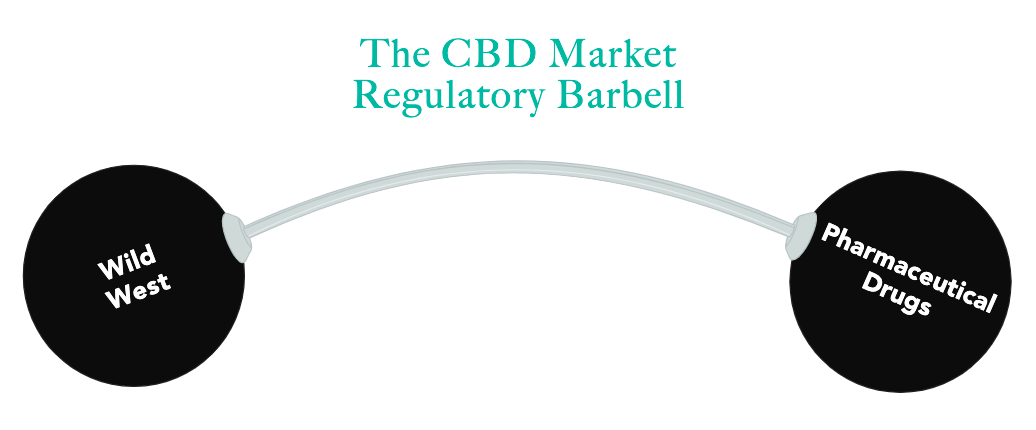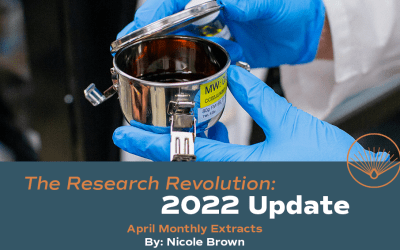Author: Dave Neundorfer, CEO
As everyone knows, the FDA is yet to create a clear legal framework for the use of cannabinoids in dietary supplements, food and beverage products. This has created a regulatory barbell effect in the market, with the “Wild West” on one side, pharmaceutical drugs on the other, and no-man’s land in between.

OBX and select forward-thinking partners are determined to change this dynamic by investing in the research to drive nutraceutical-grade products and differentiation, even if that research precedes a clear regulatory path to New Dietary Ingredient (NDI) registration.
There are some obvious challenges to this strategy.
“Isn’t it risky to invest in research that may never lead to NDI registration?”
Yes and no.
Experts think the FDA is still 3-5 years away from clarifying a path to NDI for cannabinoids.
However, we believe this risk is outweighed by the benefits of research-enabled product differentiation and brand loyalty that will be generated by companies who take this “consumer first” approach that ensures safety and therapeutic efficacy. Who knows, these data may hasten the opening of a regulatory pathway to NDI by giving Congress the information it needs to get comfortable with an accelerated legislative approach.
“Won’t it be expensive?”
Yes, safety and structure-function research is costly. So is the risk of getting lost in the thousands of other claim-less brands. Our industry desperately needs to graduate from its gun-slinging adolescence and mature into a professional global category that serves discerning consumers across the dietary supplement, food, beverage, cosmetics, and skincare markets.
“Why aren’t other companies already conducting this research?”
Some are, and we applaud them. The vast majority aren’t, which brings us back to the barbell effect.
Since the lineup of approved cannabinoid-based pharmaceutical drugs serve <1% of the population, I want to focus on the other 99%, the “quality of life” addressable market. This population knows that good CBD products work through personal experience or anecdotes from loved ones, friends, and colleagues.
This quality of life market is at risk because of the glut of unscrupulous brands whose focus on low price rather than high quality results in dismaying reports like the one the FDA delivered to Congress a couple weeks ago (good piece on that). While the three C’s—competition, compression, and COVID—are knocking out many of these low quality products, the brands that survive must do more to serve and educate their consumer base in order to thrive.
They must move to the middle of the barbell.
“What will you focus on?”
The next frontier of the cannabinoid market revolves around minor cannabinoids, which bring massive commercial and therapeutic promise to a market that’s hungry for greater differentiation and efficacy. These minor cannabinoids, such as CBC, CBDV, and THCV, occur only in small concentrations in hemp, and are therefore difficult to produce, let alone at scale, at a cost basis that the market can stomach, or at the purity levels that consumers demand.
We just acquired one of the few companies in the world that checks all of these boxes. In addition to a pharma-GLP (Good Lab Practices) certified lab outfitted for pre-clinical and clinical research, we now have a braintrust of world-class chemists who have been researching minor cannabinoids for three years with the patents and deep scientific understanding to back it up.
We intend to share this market advantage through research collaborations with some of the leading CBD and CPG brands interested in incorporating minor cannabinoids–backed by research–into their product lineup.
Imagine that each minor cannabinoid is a tree. We have healthy roots–deep understanding of the compounds with patents supporting production methods and minor cannabinoid analogs. With our partners, we will nurture a healthy trunk–stability and safety testing–needed to support healthy branches–specific formulations, routes of administration targeting specific indications–that our partners can use to drive product and brand differentiation, and, eventually, NDI registration.
By sharing our head start, our partners can attain the differentiation needed to thrive at a fraction of the cost and time it would take to go it alone.
Here’s the bottom line
By combining premium ingredients, a headstart on producing and understanding minor cannabinoids, and a biotech team that can drive research and innovation, we have everything we need to partner with forward-thinking clients that are philosophically aligned on delivering quality and efficacy to consumers, and together start addressing our market’s regulatory barbell problem.
We call this “open innovation”, and we can’t wait to announce our first open innovation partners.
Author: Dave Neundorfer, CEO
As everyone knows, the FDA is yet to create a clear legal framework for the use of cannabinoids in dietary supplements, food and beverage products. This has created a regulatory barbell effect in the market, with the “Wild West” on one side, pharmaceutical drugs on the other, and no-man’s land in between.

OBX and select forward-thinking partners are determined to change this dynamic by investing in the research to drive nutraceutical-grade products and differentiation, even if that research precedes a clear regulatory path to New Dietary Ingredient (NDI) registration.
There are some obvious challenges to this strategy.
“Isn’t it risky to invest in research that may never lead to NDI registration?”
Yes and no.
Experts think the FDA is still 3-5 years away from clarifying a path to NDI for cannabinoids.
However, we believe this risk is outweighed by the benefits of research-enabled product differentiation and brand loyalty that will be generated by companies who take this “consumer first” approach that ensures safety and therapeutic efficacy. Who knows, these data may hasten the opening of a regulatory pathway to NDI by giving Congress the information it needs to get comfortable with an accelerated legislative approach.
“Won’t it be expensive?”
Yes, safety and structure-function research is costly. So is the risk of getting lost in the thousands of other claim-less brands. Our industry desperately needs to graduate from its gun-slinging adolescence and mature into a professional global category that serves discerning consumers across the dietary supplement, food, beverage, cosmetics, and skincare markets.
“Why aren’t other companies already conducting this research?”
Some are, and we applaud them. The vast majority aren’t, which brings us back to the barbell effect.
Since the lineup of approved cannabinoid-based pharmaceutical drugs serve <1% of the population, I want to focus on the other 99%, the “quality of life” addressable market. This population knows that good CBD products work through personal experience or anecdotes from loved ones, friends, and colleagues.
This quality of life market is at risk because of the glut of unscrupulous brands whose focus on low price rather than high quality results in dismaying reports like the one the FDA delivered to Congress a couple weeks ago (good piece on that). While the three C’s—competition, compression, and COVID—are knocking out many of these low quality products, the brands that survive must do more to serve and educate their consumer base in order to thrive.
They must move to the middle of the barbell.
“What will you focus on?”
The next frontier of the cannabinoid market revolves around minor cannabinoids, which bring massive commercial and therapeutic promise to a market that’s hungry for greater differentiation and efficacy. These minor cannabinoids, such as CBC, CBDV, and THCV, occur only in small concentrations in hemp, and are therefore difficult to produce, let alone at scale, at a cost basis that the market can stomach, or at the purity levels that consumers demand.
We just acquired one of the few companies in the world that checks all of these boxes. In addition to a pharma-GLP (Good Lab Practices) certified lab outfitted for pre-clinical and clinical research, we now have a braintrust of world-class chemists who have been researching minor cannabinoids for three years with the patents and deep scientific understanding to back it up.
We intend to share this market advantage through research collaborations with some of the leading CBD and CPG brands interested in incorporating minor cannabinoids–backed by research–into their product lineup.
Imagine that each minor cannabinoid is a tree. We have healthy roots–deep understanding of the compounds with patents supporting production methods and minor cannabinoid analogs. With our partners, we will nurture a healthy trunk–stability and safety testing–needed to support healthy branches–specific formulations, routes of administration targeting specific indications–that our partners can use to drive product and brand differentiation, and, eventually, NDI registration.
By sharing our head start, our partners can attain the differentiation needed to thrive at a fraction of the cost and time it would take to go it alone.
Here’s the bottom line
By combining premium ingredients, a headstart on producing and understanding minor cannabinoids, and a biotech team that can drive research and innovation, we have everything we need to partner with forward-thinking clients that are philosophically aligned on delivering quality and efficacy to consumers, and together start addressing our market’s regulatory barbell problem.
We call this “open innovation”, and we can’t wait to announce our first open innovation partners.



